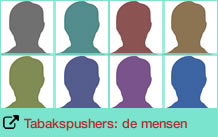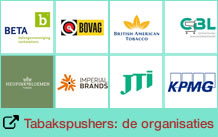Dutch Customs publishes MoU with tobacco industry
Experts condemn agreement that gives industry influence
03 February 2025
Dutch Customs has released a secret cooperation agreement between the Dutch government and the tobacco industry on combating tobacco smuggling after TabakNee requested this. Experts say such agreements conflict with international agreements and, above all, do not work. ‘The Dutch government has fallen into the industry’s trap.’
The text was secret for no less than fifteen years. During that time, the outside world did not know what was in the agreement that the then general director of Customs, Willy Rovers, concluded on 16 June 2011 with the Stichting Sigarettenindustrie and the Vereniging Nederlandse Keftabakindustrie (now together the Vereniging Nederlandse Sigaretten- en Keftabakfabrikanten, VSK). The fact that the government, despite the strict rules of the WHO Framework Convention on Tobacco Control on contacts with the tobacco industry, entered this partnership to tackle smuggling and illegal trade in tobacco products, has been criticised many times. Nevertheless, the Memorandum of Understanding (MoU) remained confidential. Until TabakNee drew attention to it again last year and asked questions about it. After that, Customs decided to make the agreement public.
Government and tobacco industry as partners
The MoU is now on the web page where the contacts with the tobacco industry are published. It consists of the signed agreement with the SSI and VNK at the time, plus an Annex that was concluded with each tobacco manufacturer separately and in which the agreements are further elaborated. The text shows that the government and the tobacco industry act as partners who not only exchange information with each other and organise at least two meetings per year, but also promise each other assistance in the detection, investigation, identification and prosecution of suspects. The MoU states that smuggling and illegal trade in tobacco products lead to ‘damage’ for governments and the tobacco industry. The loss of tax revenues and turnover damage would assume ‘such proportions’ that ‘joint action is desirable.’ However, nowhere in the text does it state how big these problems actually are. Furthermore, there would be an increase in smuggling of counterfeit products, which pose a ‘significant risk’ to ‘the health of users’ because ‘inferior and dangerous raw materials are often used.’
Information remains confidential
Customs and the tobacco industry have agreed in the MoU to set up a ‘fixed structure’ to exchange information to combat smuggling and illegal trade in tobacco products and counterfeiting. The parties meet at least twice a year. According to the agreement, ‘all information’ that results from the cooperation will be kept ‘confidential’. Also, they cannot demand that they provide each other data if this amounts to cooperating in ‘self-conviction’.
The Annex states that Customs and tobacco manufacturers exchange information on general trends and the market, product information and the detection of the origin of seized goods, improvement of the supply chain and control mechanisms, and on specific investigations. In consultation, they also determine research topics that the parties will tackle together. If Customs and tobacco companies agree, they will communicate trends and research results to external parties.
Assistance in detecting counterfeiting
More specifically, Customs wants to ‘work closely’ with the tobacco industry to ‘identify, trace, discourage and prevent’ the trade in illegal and counterfeit products. The manufacturers promise to share information from their internal investigations into illegal trade activities, so that Customs and fiscal investigation agency FIOD can get to work on it.
A large part of the Annex concerns counterfeiting. In a special paragraph on this, the tobacco industry promises to help Customs with information about production locations, shipments, supply chains and how this counterfeiting is transported to the Netherlands. Furthermore, the sector will provide data about distributors that have been approved and those with whom the cooperation has been terminated. If necessary, Customs will help the tobacco sector with investigations into the trade in counterfeit products.
The parties also work together if illegal trade has been detected and products have been seized. The tobacco manufacturer offers Customs and FIOD ‘reasonable support’ in identifying products and traders involved. The manufacturer will analyse the goods by means of random samples to determine whether they are genuine or counterfeit. If a production facility is found, the tobacco manufacturer can come and inspect the machines and materials. The evaluation report must then be shared with the authorities and the FIOD must be informed of the suspected sources, or suspects.
Customs, in turn, will inform manufacturers of ‘any concerns’ about traders and markets if they are the source of ‘significant volumes’ of smuggled tobacco products that are seized. Tobacco companies will ‘take all reasonable steps’ to support the FIOD in prosecuting traders in illegal tobacco products, such as providing witness statements that can be used in Dutch judicial authorities.
Experts criticize lack of transparency
According to experts, the agreement conflicts with the United Nations’ WHO Framework Convention on Tobacco Control (FCTC), which the Netherlands has signed and ratified. If a government does conclude an MoU with the tobacco industry, it may only do so if it is strictly necessary while ‘maximum transparency’ must be observed, the FCTC secretariat states in response to questions from TabakNee.
This is not the case with the Dutch agreement. “They wanted to keep the MoU secret and are aiming for cooperation and exchange of data at regular intervals. This conflicts with the WHO Protocol to Eliminate Illicit Trade in Tobacco Products, which points out the dangers of the possible role of the tobacco industry in the illegal tobacco trade,” says Luk Joossens, international expert in the field of tobacco smuggling and control.
Furthermore, the parties also keep the information they exchange during their meetings in-house. This was already apparent from the summary and often meaningless minutes that Customs makes of the meetings with the tobacco industry, which TabakNee previously reported on. The reports are completely inadequate for outsiders to know what was discussed and do not provide transparency about the government’s contacts with the tobacco industry. With the publication of the MoU, two more minutes have also been published, from the second meeting in 2023 and the first meeting in 2024.
Undesirable agreements
In general, MoUs are ‘non-binding or unenforceable agreements’ with the tobacco industry. Such voluntary agreements mean that parties, as in the Dutch case, do not have to account for themselves and no fines are imposed. The FCTC secretariat rejects such agreements, referring to the Guidelines for implementation of Article 5.3 of the WHO Framework Convention.
“Toothless documents,” Stanton Glantz, retired professor at the University of California, San Francisco (UCSF) and former director of the Center for Tobacco Control Research and Education (CTCRE), calls the Dutch MoU in a response to TabakNee. “These documents show that the Dutch government has fallen into the industry’s trap.”
It is also problematic that the Dutch MoU has no end date and is unlimited in duration. “An end point forces both parties to evaluate whether they want to extend the MoU,” researchers from the Trimbos-institute write in The Netherlands Tobacco Industry Interference Index 2023. But now there is no such deadline. The collaboration will therefore continue until it is actively stopped. “The longer these parties work together, the less likely it is that this will happen,” according to the Trimbos researchers.
Alertness is required
There are several reasons to be alert. The industry has ‘low reliability’, says expert and Associate Professor Eric Crosbie from the School of Public Health at the University of Nevada Reno and affiliated with the CTCRE, in response to the now published Dutch MoU. With CTCRE-colleague Stella Bialous and professor Glantz, Crosbie previously published in Tobacco Control about MoUs as a strategic instrument of the tobacco industry to get in touch with policymakers. Crosbie points out that many documents show that tobacco companies were not only involved in smuggling themselves but have also been found guilty of it numerous times, particularly in Europe.
During the negotiations on the WHO Protocol to Eliminate Illicit Trade in Tobacco Products (ITP, 2012), which proposes a package of measures that countries should preferably take together, the industry pulled out all the stops to stop that protocol. How this worked was described by Bialous in the report The Tobacco Industry and the Illicit Trade in Tobacco Products, published in 2021.
When it failed to stop it, the industry tried to water down the wording in the protocol to ensure that there would be ‘minimal restrictions’ on its own business. Another method of taking the wind out of governments’ sails was the increasing number of MoUs. There are now more than hundred such agreements between governments and the tobacco industry worldwide, Crosbie, Bialous and Glantz found in 2019.
MoUs give tobacco industry big influence
As it has become harder for industry to get a seat at government departments, MoUs are a strategic tool to break through that barrier. “The FCTC is at the crux of the issue,” says Crosbie, “because Article 5.3 prevents and limits industry stakeholder involvement in tobacco control policy development. Industry documents show that the industry used and continues to use these agreements to undermine the FCTC treaty and any policies trying to regulate illicit tobacco trade. The usage of MoUs is also an example of a standard industry tactic in which tobacco companies try to employ voluntary agreements so that they are ‘part of the solution’ and are not regulated as much as mandatory policies and regulations. MoUs allow the tobacco industry to somewhat bypass Article 5.3 and have direct access to border patrols and customs bodies. This provides them tremendous influence.”
Profiling as a ‘partner’
The FCTC secretariat warns in the meantime that the agreements enable the tobacco industry to ‘systematically’ present itself as a ‘partner’ of governments. Such confidence is also evident in the Dutch MoU. The industry makes a good impression with these agreements and classifies them under the heading of ‘corporate social responsibility’. The FCTC secretariat therefore also considers these agreements as ‘a form of marketing’.
“The Convention Secretariat supports parties in maximizing transparency and rejecting partnerships and non-binding or unenforceable agreements with the tobacco industry and to remain alert to any attempt by the tobacco industry to undermine or disrupt strategies to combat illicit tobacco trade”, a spokesperson for the secretariat reports.
The conclusion of all experts that TabakNee spoke to is, in short, that the Dutch government must stop this collaboration.
tags: WHO | Customs | tobacco industry | MoU | FCTC | transparency









 Stichting Rookpreventie Jeugd is geregistreerd als Algemeen Nut Beogende Instelling (RSIN: 820635315 | KvK: 34333760).
Stichting Rookpreventie Jeugd is geregistreerd als Algemeen Nut Beogende Instelling (RSIN: 820635315 | KvK: 34333760).